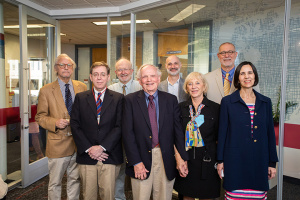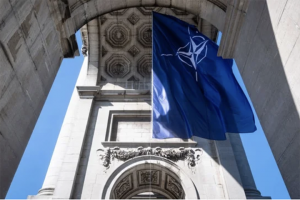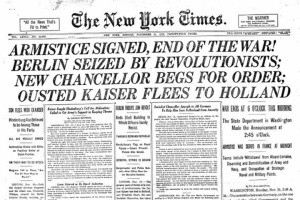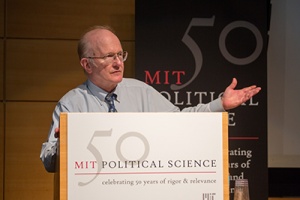
Stephen Van Evera
Professor of Political Science, Emeritus
International relations; war; foreign policy; security policy; US intervention.
Biography
Stephen Van Evera is Ford International Professor in the MIT Political Science Department. Prof. Van Evera works in several areas of international relations: the causes and prevention of war, U.S. foreign policy, U.S. security policy, U.S. intervention in the Third World, international relations of the Middle East, and international relations theory. He has published books on the causes of war and on social science methodology, and articles on American foreign policy, American defense policy, nationalism and the causes of war, the origins of World War I, and U.S. strategy in the War on Terror. He currently serves as chair of the Tobin Project committee on national security.
Research
Stephen Van Evera's research interests include the causes and prevention of war, with focus on the role of national misperception as a cause of war, and on organized religions as causes of war or peace; U.S. foreign policy; U.S. security policy; international relations theory; and social science methods, with focus on qualitative methods. He has published books on the causes of war and on social science methods, and articles on American foreign policy, American defense policy, the origins of World War I, nationalism and the causes of war, the origins of national identity, American intervention in the developing world, Europe's future international relations, the Israel-Arab conflict, and U.S. strategy in the war on al-Qaeda.
Recent Publications
"Using U.S. Leverage to Abate Conflicts That Harm U.S. Security," in Stephen Van Evera and Sidharth Shah, eds., The Prudent Use of Power in American National Security Strategy, The Tobin Project, 2010.
"Public Diplomacy: Ideas for the War of Ideas," with Peter Krause, Middle East Policy, Vol. XVI, No. 3, Fall 2009, pp. 106-134.
"A Farewell to Geopolitics," In Melvyn P. Leffler and Jeffrey W. Legro, eds., To Lead the World: American Strategy after the Bush Doctrine, (Oxford, 2008) pp. 11-35.
"The War on Terror: Forgotten Lessons from WWII" Middle East Policy (Vol. XIV, No. 2, Summer 2007).
"Iraq: Canary in a Coal Mine," MIT International Review, Spring 2007.
Teaching
| 17.42 | The Causes and Prevention of War |
| 17.428 | American Foreign Policy: Theory and Method |
| 17.432 | Causes and Prevention of War: Theory and Method |
| 17.40 | American Foreign Policy |
News
Biography
Stephen Van Evera is Ford International Professor in the MIT Political Science Department. Prof. Van Evera works in several areas of international relations: the causes and prevention of war, U.S. foreign policy, U.S. security policy, U.S. intervention in the Third World, international relations of the Middle East, and international relations theory. He has published books on the causes of war and on social science methodology, and articles on American foreign policy, American defense policy, nationalism and the causes of war, the origins of World War I, and U.S. strategy in the War on Terror. He currently serves as chair of the Tobin Project committee on national security.
Research
Stephen Van Evera's research interests include the causes and prevention of war, with focus on the role of national misperception as a cause of war, and on organized religions as causes of war or peace; U.S. foreign policy; U.S. security policy; international relations theory; and social science methods, with focus on qualitative methods. He has published books on the causes of war and on social science methods, and articles on American foreign policy, American defense policy, the origins of World War I, nationalism and the causes of war, the origins of national identity, American intervention in the developing world, Europe's future international relations, the Israel-Arab conflict, and U.S. strategy in the war on al-Qaeda.
Recent Publications
"Using U.S. Leverage to Abate Conflicts That Harm U.S. Security," in Stephen Van Evera and Sidharth Shah, eds., The Prudent Use of Power in American National Security Strategy, The Tobin Project, 2010.
"Public Diplomacy: Ideas for the War of Ideas," with Peter Krause, Middle East Policy, Vol. XVI, No. 3, Fall 2009, pp. 106-134.
"A Farewell to Geopolitics," In Melvyn P. Leffler and Jeffrey W. Legro, eds., To Lead the World: American Strategy after the Bush Doctrine, (Oxford, 2008) pp. 11-35.
"The War on Terror: Forgotten Lessons from WWII" Middle East Policy (Vol. XIV, No. 2, Summer 2007).
"Iraq: Canary in a Coal Mine," MIT International Review, Spring 2007.
Teaching
| 17.42 | The Causes and Prevention of War |
| 17.428 | American Foreign Policy: Theory and Method |
| 17.432 | Causes and Prevention of War: Theory and Method |
| 17.40 | American Foreign Policy |




